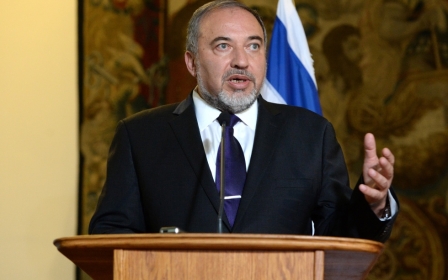Netanyahu re-elected as Israeli ruling party leader

Israeli Prime Minister Benjamin Netanyahu won another term as leader of the ruling Likud party ahead of a snap election, his group said Thursday, easily defeating his lone hard-right challenger.
Netanyahu is seeking a third straight stint in office, and a fourth in total. He has been in power since 2009, following a first term in 1996-1999.
The primary win clears the way for Netanyahu to lead his rightwing party into battle for a general election in March.
"With nearly 60 percent of the ballots counted, Benjamin Netanyahu took 80 percent of the vote and Danny Danon 20 percent," Likud spokeswoman Noga Katz told AFP, adding that the final results would be known later Thursday.
Turnout was more than 53 percent, according to an official estimate released soon after polls closed.
Likud's 96,651 members also voted to determine front runners on the party list for the 17 March election.
In a previous primary in January 2012, members voted out three leading moderates, heralding a shift to the right.
"Voters will be determining not only the face of Likud but its ideological agenda in the years to come," Yuval Karni wrote in the Yediot Aharonot newspaper, which holds an anti-Netanyahu stance, ahead of Wednesday's vote.
General elections had been due in late 2017, but the polls were brought forward by Netanyahu in early December after the collapse of his fractious coalition.
Casting his ballot at a polling station in Jerusalem on Wednesday, Netanyahu said the party must unify in the face of threats from the left.
"It is important at the end of the day that there be one strong Likud against the left in order to lead the state of Israel safely," he said.
Challenge from centre left
Polls suggest Likud is likely to face a challenge from a centre-left alliance of the opposition Labour party and the centrist HaTnuah of former justice minister Tzipi Livni in the March general election.
Observers say a centre-left government would be much more likely to resume peace talks with the Palestinians.
Livni was Israel's chief negotiator during the last round of US-brokered talks, which collapsed in April mainly over the issue of settlement building.
The left has also criticised Israel's immigration policy, after Netanyahu's government pushed for a harsher crackdown on African asylum-seekers, whom it refers to as "infiltrators".
Commentator Yoaz Hendel said ahead of the primary that Likud was a party "fighting for survival" with little to offer in terms of dynamic leaders likely to garner votes.
"Today's Likud has no new, youthful, charismatic energy, and there is also no range of opinions," he wrote in Yediot.
"When Likud loses the ability to present itself as a rightwing, liberal, pragmatic party, it also loses its ability to govern. It loses its ability to attract voters from the centre."
Seventy candidates were vying for places on the party list, with all 18 of its lawmakers running for re-election except outgoing Culture and Sport Minister Limor Livnat, who is retiring from politics.
A law passed in March which raises the threshold of votes parties require to be represented in parliament could see many parties making alliances.
Immigration reaches high
While a review of Israel’s immigration policy is a pressing issue on the Likud’s agenda, the immigration ministry said Wednesday, the number of Jews moving to Israel leapt in 2014 to its highest figure in a decade, with western Europe leading the way.
Immigration hit a 10-year high, with the arrival of some 26,500 new residents, according to a joint statement with the Jewish Agency, a quasi-governmental organisation tasked with encouraging Jews to move to Israel.
This marks a significant 32 percent increase over last year's approximately 20,000 immigrants, the statement said.
This "was a year of record-breaking aliyah," Jewish Agency chairman Natan Sharansky said, using the Hebrew word for immigration to Israel.
It "also saw a historic shift: for the first time in Israel's history, the number of immigrants who came to Israel from the free world is greater than that of immigrants fleeing countries in distress."
For the first time ever, France provided the biggest number, as more than 6,600 Jews moved to Israel. That was nearly twice the 3,400 who arrived in 2013.
Overall, immigration from Western Europe increased 88 percent, with the arrival of some 8,640 people, compared with 4,600 a year earlier.
Some 620 arrived from Britain, compared with 520 a year earlier, and the number from Italy doubled to 340. Around 240 arrived from Belgium, a slight decrease, and the number from Germany remained stable, at approximately 120.
Immigration from former Soviet Union countries saw a 50 percent increase, with the arrival of some 11,430 people, compared with 7,610 in 2013.
That was largely driven by an exodus from conflict-wracked Ukraine, where the number surged 190 percent to 5,840.
More than half of all people moving to Israel in 2014 were under 35, among them 5,300 children and some 8,200 adults aged between 18-34.
Tel Aviv was the city which received the highest number of immigrants, at around 3,000. It was followed by the northern coastal city of Netanya and then Jerusalem.
More than three million Jews have immigrated to Israel since its creation in 1948 - including one million from former Soviet states since 1990 - under the Law of Return, which offers citizenship and benefits to Jews from anywhere in the world.
Middle East Eye propose une couverture et une analyse indépendantes et incomparables du Moyen-Orient, de l’Afrique du Nord et d’autres régions du monde. Pour en savoir plus sur la reprise de ce contenu et les frais qui s’appliquent, veuillez remplir ce formulaire [en anglais]. Pour en savoir plus sur MEE, cliquez ici [en anglais].




